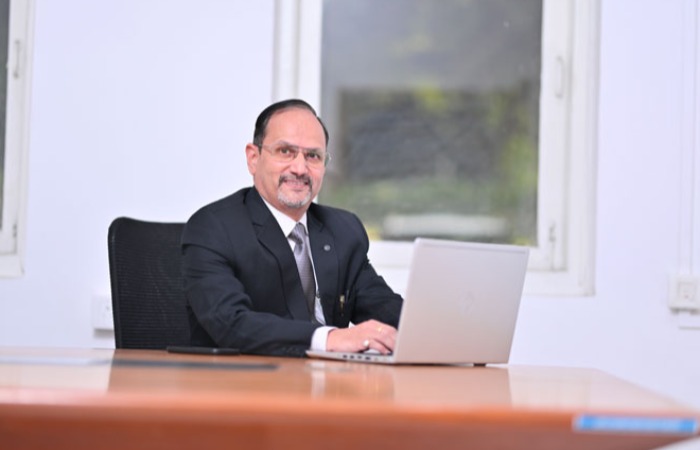
We are extremely bullish on the Indian CE market
Prafulla Deoskar, GM - Transmission Division, Kirloskar Pneumatic Company.
How do you view the current momentum in India’s construction equipment sector and the role of Excon in driving industry growth?
The current momentum in India’s construction equipment sector is robust, driven by the government’s unprecedented focus on infrastructure development. While we’ve seen some short-term cyclical challenges, the long-term outlook remains unquestionably positive. India is poised to become the second-largest construction equipment market globally by the turn of the decade. This growth is also fuelled by increased mechanisation, particularly in rural and semi-urban markets.
Excon serves as the most critical convergence point for the industry to showcase the latest technological advancements in the construction industry equipment. It’s a platform for vital discussions between industry leaders, policymakers, and government bodies, helping align the industry’s capabilities with the nation’s infrastructural vision. For a division like ours, Excon is crucial for generating business, understanding evolving customer needs, and positioning our precision-engineered transmission solutions—the very heart of efficient machine operation—to a broad audience of OEMs, EPC companies and turn key project equipment suppliers.
What key trends or technological shifts are shaping your product development and market strategy for India?
The trend today is to design a gearbox in such a way that it gains maximum on power density and efficiency. Our strategy is focused on leveraging our expertise in specialised, high-precision gearboxes—drawing from our lineage in complex transmissions (eg: railways, marine, wind turbine and high-speed applications)—to provide solutions for equipment builders in construction and infrastructure industry.
Cost over performance is a major ratio for positioning our product in the industry. A brand like Kirloskar entails a legacy of precise engineering and high reliability. Gears and gearboxes mostly serve as a “vital link” in the total drive mechanism in the process industry. Therefore, the reliability factor assumes a paramount importance. It’s our constant endeavour to pack maximum value in our product so that our customers do not mind the initial investment compared to consistent and trouble-free performance that they receive for years.
With growing emphasis on sustainability, how is your company aligning with cleaner, energy-efficient, or alternate-fuel technologies?
As a precision engineering company providing critical components, our primary sustainability alignment is cantered on energy efficiency and enabling alternate-fuel technologies through our core products.
- Maximising energy efficiency: Our transmission division’s core mission is to minimise power loss. By producing high-accuracy gears (up to DIN Class 3/4), we significantly reduce friction and ensure maximum power transfer from the prime mover which may be a motor, engine or a turbine to the driven equipment.
- Designing quiet, low-vibration gearboxes with robust casing to ensure rigidity while delivering instant high torque delivery.
- Process sustainability: Within our forging facilities, we have totally done away with carbon emitting fuels. We are committed to sustainable practices, including achieving global benchmarks and leaving lowest carbon footprints.
How do you see the balance evolving between localisation, cost competitiveness, and global quality standards?
The balance between localisation (Aatmanirbharta), cost competitiveness, and global quality standards is the new strategic imperative for India’s manufacturing sector. For Kirloskar Pneumatic, this balance is intrinsic to our business model:
- Localisation is a strength: We have a deep, decades-long manufacturing base and a mature local supply chain in India. This “Design and Make in India” philosophy ensures a shorter, more flexible supply chain, which is key to cost competitiveness and faster response times.
- We can proudly say that Kirloskar Pneumatic is the first company in India that designed and manufactured high speed gearbox for steam turbine applications without any European or Americal collaboration. We have more than 200 installations now and supplied gearboxes up to 50 MW power transmission capacity.
- Quality is non-negotiable: Our commitment is to meet and exceed global quality benchmarks. Our standards, such as producing high-accuracy gears and adhering to international certifications.
- Achieving cost competitiveness: We achieve cost leadership not through compromising quality, but through operational excellence, lean manufacturing, and scale of production within our integrated facilities. By owning the entire process—from forging to precision finishing—we control costs while maintaining the highest engineering quality.
What is your outlook for the Indian construction equipment market in the next three to five years?
We are extremely bullish on the Indian construction equipment market for the next three to five years. We anticipate sustained double-digit growth, driven by three core pillars:
- Sustained government capex: The government’s focus on capital expenditure in road, rail, metro, and port development is unlikely to slow down. The momentum created by massive projects under the National Infrastructure Pipeline provides a long-term demand visibility for construction equipment and, by extension, for our critical transmission components.
- Increased mechanisation and rental market: The shift from manual labour to mechanized processes in construction will continue.
- Export potential and global supply chain shift: With India being a highly cost-effective and quality-compliant manufacturing hub, we foresee a major opportunity to increase exports. We expect to not only supply the domestic market but also to become a major component supplier within the global construction equipment value chain.
Our division is strategically positioned to capitalise on this outlook by providing the high-efficiency, reliable, and technologically advanced transmission systems needed to power India’s next wave of infrastructure development.


 +91-22-24193000
+91-22-24193000 Subscriber@ASAPPinfoGlobal.com
Subscriber@ASAPPinfoGlobal.com